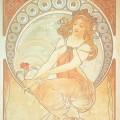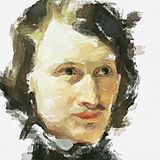Klikk på en bok for å legge inn et sitat.
Viser 1 til 10 av 17 sitater
As soon as the French throne is occupied by the legitimate sovereign no prince in the world could dream of seizing it, but as long as it is vacant it will be the object of covetousness and intrigue by every kind of royal ambition. Moreover, since it has been pushed to the dust, power is within the reach of anyone. Orderly government excludes an infinity of schemes, but under the rule of a false sovereignty there is no end of chimerical plots. All passions are unchained and every hope is licensed. The cowards who reject the king for fear of civil war are actually preparing the way for it. It is just because they foolishly desire stability and the constitution that they will have neither stability nor the constitution. There is no perfect security for France in the present situation. Only the king, the legitimate king, wielding the sceptre of Charlemagne from the majesty of his throne, can dampen or disarm all these hatreds and outwit all these sinister plots. Only he by his command can make order of all these ambitions, calm excited minds, and suddenly surround authority with that magic wall which is its true guardian.
Is there a single country in the world where you can find a Council of Five Hundred, a Council of Elders and five Directors? This constitution might be offered to any human association from China to Geneva. But a constitution that is made for all nations is made for none; it is a pure abstraction, an academic exercise made according to some hypothetical ideal, which should be addressed to man in his imaginary dwelling place.
What is a constitution? Is it not merely the solution of the following problem? Given the population, the mores, the geographic situation, the political circumstances, the wealth, the good and the bad qualities of a particular nation, to find the laws that suit it.
The constitution of 1795, like its predecessors, was made for man. But there is no such thing as man in the world. In my lifetime I have seen Frenchmen, Italians, Russians etc.; thanks to Montesquieu, I even know that one can be Persian. But as for man, I declare that I have never in my life met him; if he exists, he is unknown to me.
Religion surrounds us on all sides; everything speaks its language to us. Its characters are imprinted on our flags, our coinage, our medals of honour, our ornaments, our buildings, and all our monuments. It animates, vivifies, perpetuates, and infuses our legislation. It sanctions our customs; it presides over our treatises. It has formed the great European family. Its gentle laws calmed our ferocity and helped unite our divergent spirits. From St. Petersburg to Madrid, people made contracts in the name of the very holy and indivisible Trinity. It was the great family title and the proof of a common kinship. The hideous hand of revolutionary genius came to efface this sacred formula, and it has destroyed...
There is a satanic quality to the French Revolution that distinguishes it from everything we have ever seen or anything we are ever likely to see in the future. Recall the great assemblies, Robespierre's speech against the priesthood, the solemn apostasy of the clergy, the desecration of objects of worship, the installation of the goddess of reason, and that multitude of extraordinary actions by which provinces sought to outdo Paris. All this goes beyond the ordinary circle of crime and seems to belong to another world.
No doubt the French Revolution has lasted long enough to go through several phases; nevertheless, its general character has never varied, and from its birth there was evidence of what it would become. There was a certain inexplicable delirium, a blind impetuosity, a scandalous contempt for everything respectable, a new kind of atrocity that joked about its crimes, and especially, an imprudent prostitution of reasoning and of every word meant to express ideas of justice and virtue.
Now what distinguishes the French Revolution and makes it an event unique in history is that it is radically bad. No element of good disturbs the eye of the observer; it is the highest degree of corruption ever known; it is pure impurity. On what page of history will you find such a great quantity of vices assembled at one time on the same stage? What horrible assemblage of baseness and cruelty! What profound immorality! What absence of all decency! The characteristics of the springtime of liberty are so striking that it is impossible to be mistaken. It is a time when love of the fatherland is a religion and respect for the laws a superstition, a time of sturdy character and austere morals, when every virtue flourishes at once, when factions benefit the fatherland because they fight only for the honour of serving it, when everything, even crime, carries the mark of greatness. If this picture is compared to the one offered us by France, how can anyone believe in the performance of a liberty that springs from gangrene? Or, more precisely, how can one believe that this liberty can be born (since it does not yet exist) or that from the heart of the most disgusting corruption there can emerge a form of government that less than any other may dispense with virtue? When one hears these so-called republicans talk of liberty and virtue, one thinks of a faded courtesan with rouged blushes putting on the airs of a virgin.
Evil has nothing in common with life; it cannot create, since its power is purely negative. Evil is the schism of being; it is not true.
There is nothing but violence in the universe; but we are spoiled by a modern philosophy that tells us all is good, whereas evil has tainted everything, and in a very real sense, all is evil, since nothing is in its place. The keynote of the system of our creation has been lowered, and following the rules of harmony, all the others have been lowered proportionately. All creation groans, and tends with pain and effort towards another order of things.
Yet there is room to doubt whether this violent destruction is, in general, such a great evil as is believed; at least, it is one of those evils that enters into an order of things where everything is violent and against nature, and that produces compensations. First, when the human soul has lost its strength through laziness, incredulity, and the gangrenous vices that follow an excess of civilization, it can be retempered only in blood. Certainly there is no easy explanation of why war produces different effects in different circumstances. But it can be seen clearly that mankind might be considered as a tree which an invisible hand is continually pruning and which often profits from the operation. In truth the tree may perish if the trunk is cut or the tree is overpruned; but who knows the limits of the human tree? What we do know is that excessive carnage is often allied with excessive population, as was seen especially in the ancient Greek republics and in Spain under the Arab domination. Platitudes about war mean nothing. One need not be very clever to know that when more men are killed, fewer remain at the moment, just as it is true that the more branches one cuts off, the fewer remain on the tree. But the results of the operation are what must be considered. Moreover, following the same comparison, we may observe that a skillful gardener directs the pruning less towards lush vegetation than towards the fructification of the tree; he wants fruit, not wood or leaves. Now the real fruits of human nature—the arts, sciences, great enterprises, lofty conceptions, manly virtues—are due especially to the state of war. We know that nations have never achieved the highest point of the greatness which they are capable except after long and bloody wars. Thus, Greece's most brilliant hour was the terrible epoch of the Peloponnesian War; the Age of Augustus followed immediately the civil war and proscriptions; French genius was hewn by the League and polished by the Fronde, all the great men of the century of Queen Anne were born in the midst of political upheavals. In a word, we can say that blood is the manure of the plant we call genius.









































